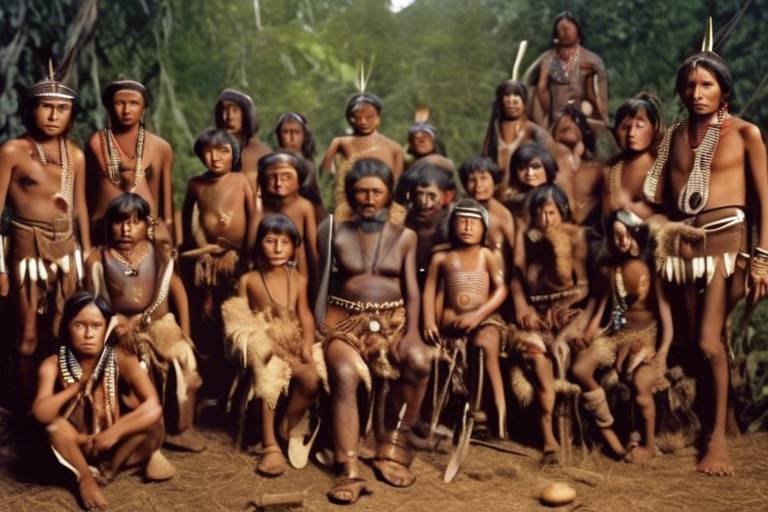The Role of Colonialism in Shaping Modern Nations
Colonialism stands as a pivotal force that has left an indelible mark on the trajectory of modern nations worldwide. The repercussions of historical colonization reverberate through the present-day political, social, and economic landscapes, shaping the very core of societies in profound ways.
One of the most profound impacts of colonialism lies in its influence on the cultural identity of indigenous populations in colonized regions. The imposition of foreign customs, languages, and belief systems has often led to a dilution of traditional heritage and the erosion of ancestral traditions, leaving communities grappling with a sense of cultural dissonance.
Moreover, the economic exploitation perpetuated by colonial powers has sown seeds of enduring dependency and imbalance in resource allocation. The legacy of resource extraction, trade disparities, and mounting debt burdens continues to haunt post-colonial nations, hindering their economic sovereignty and perpetuating cycles of poverty.
Colonial legacies have also deeply entrenched themselves in the political institutions and governance structures of modern nations. The power dynamics, administrative frameworks, and institutional hierarchies bear the imprints of colonial rule, shaping the very foundations of governance and perpetuating inequities in access to power.
Furthermore, the social fabric of post-colonial societies is marred by enduring social hierarchies, racial prejudices, and discriminatory practices that find their roots in colonial histories. The legacy of divide and rule policies continues to manifest in societal stratifications, impeding efforts towards social cohesion and inclusive development.
The impact of colonialism extends to language and education, with the imposition of colonial languages and educational systems reshaping knowledge transmission and intellectual discourse in contemporary societies. The dominance of foreign languages and curricula often marginalizes indigenous knowledge systems, perpetuating a legacy of intellectual subjugation.
Resistance movements and nationalist ideologies have emerged as potent forces in the struggle against colonial legacies, shaping the contours of modern nation-states. The fervor of anti-colonial struggles, independence movements, and nationalist uprisings underscores the resilience of communities in reclaiming their autonomy and asserting their cultural identities.
Border disputes and ethnic conflicts continue to simmer in many regions, fueled by colonial-era divisions, arbitrary borders, and ethnic classifications that fail to align with the complex tapestry of identities and affiliations. The legacy of colonial cartography and territorial demarcations serves as a potent source of conflict, perpetuating tensions and impeding efforts towards peaceful coexistence.
Moreover, the specter of neocolonialism looms large in the contemporary geopolitical landscape, with former colonial powers, international institutions, and multinational corporations exerting influence over the economic policies, trade relations, and strategic interests of post-colonial nations. The enduring power dynamics underscore the need for vigilance in safeguarding the sovereignty and self-determination of nations in the face of external pressures.

Impact on Cultural Identity
Exploring how historical colonization impacts the current political, social, and economic landscapes of countries worldwide.
Colonialism has left an indelible mark on the cultural identity of nations it once ruled. Indigenous populations in colonized regions have seen their cultural heritage and traditions significantly influenced by the imposition of foreign customs and beliefs. The colonizers' language, religion, and social norms often replaced or overshadowed the indigenous practices, leading to a complex blend of traditions that continues to shape the cultural landscape of these countries.

Economic Exploitation and Dependency
Colonialism left a deep imprint on the economic structures of many nations, leading to a complex web of exploitation and dependency that continues to influence their development today. The economic exploitation by colonial powers was often brutal, characterized by the extraction of natural resources, forced labor, and unfair trade practices that enriched the colonizers at the expense of the colonized.
This exploitation created a dependency on the colonial powers for finished goods, capital, and technology, perpetuating a cycle of economic subjugation that hindered the growth and self-sufficiency of the colonized nations. The legacy of this economic exploitation can still be seen in the persistent trade imbalances, debt burdens, and underdevelopment experienced by many post-colonial countries.
Furthermore, the imposition of colonial economic structures and policies disrupted traditional economic systems and marginalized local industries, leading to a reliance on export-oriented economies and a lack of diversification. This narrow economic focus left many nations vulnerable to global market fluctuations and external shocks, exacerbating their economic fragility and perpetuating a cycle of dependency on foreign aid and investment.
The economic legacy of colonialism continues to shape the development trajectories of many nations, highlighting the need for sustainable economic policies, investment in local industries, and efforts to break free from the cycle of exploitation and dependency that has plagued post-colonial economies for generations.

Political Institutions and Governance
When delving into the realm of political institutions and governance, the lingering effects of colonialism become starkly evident. The seeds of governmental structures, administrative systems, and power hierarchies sown during the colonial era continue to bear fruit in the modern landscape of post-colonial nations. These inherited frameworks often reflect the interests and agendas of former colonial powers, shaping the political dynamics and decision-making processes of independent states.
The legacy of colonial rule can be observed in the persistence of centralized governance models, bureaucratic practices, and legal frameworks that prioritize the elite few over the marginalized many. The concentration of power in the hands of a privileged minority, a hallmark of colonial administrations, has perpetuated a cycle of corruption, nepotism, and authoritarianism in many post-colonial governments.
Moreover, the imposition of foreign legal systems and political ideologies by colonial rulers has left a lasting imprint on the institutional structures of newly independent nations. The transplantation of Western-style democracies, often ill-suited to the cultural contexts of colonized societies, has bred instability, conflict, and governance challenges in many regions.
Despite efforts to decolonize political institutions and foster indigenous forms of governance, the legacy of colonialism continues to shape the power dynamics and decision-making processes in contemporary societies. The struggle to establish inclusive, transparent, and accountable political systems free from the vestiges of colonial rule remains a pressing challenge for many post-colonial nations.

Social Hierarchies and Discrimination
Social hierarchies and discrimination are deeply rooted in the legacy of colonialism, shaping the societal structures and interactions in post-colonial nations. The stratification of society into distinct classes based on race, ethnicity, and socio-economic status can be traced back to the colonial era, where colonizers imposed their values and norms on indigenous populations. This resulted in the marginalization and oppression of certain groups, perpetuating inequalities that continue to persist today.
Discriminatory practices, such as segregation, institutionalized racism, and unequal access to resources, have become ingrained in the social fabric of many former colonies. These practices not only hinder social cohesion but also limit the opportunities for marginalized communities to thrive and participate fully in society. The effects of colonialism on social hierarchies are evident in the persistence of caste systems, colorism, and other forms of discrimination that have endured through generations.
Furthermore, the legacy of colonialism has contributed to the reinforcement of stereotypes, prejudices, and biases that fuel discriminatory attitudes and behaviors. These ingrained beliefs often lead to systemic injustices, exclusion, and marginalization of certain groups within society. Addressing social hierarchies and discrimination requires a comprehensive understanding of historical injustices and a commitment to dismantling oppressive structures that perpetuate inequality.
In the post-colonial context, efforts to promote social equality, inclusivity, and diversity are essential in challenging the entrenched power dynamics that sustain discrimination. Education, advocacy, and policy reforms play a crucial role in addressing social hierarchies and fostering a more equitable society where all individuals have equal opportunities and rights. By acknowledging the impact of colonial legacies on social structures and actively working towards social justice, communities can strive towards a more inclusive and harmonious future.

Language and Education
Language and education are two crucial aspects profoundly impacted by colonialism, shaping the modern identity of nations. When colonial powers imposed their languages on indigenous populations, they not only altered communication but also influenced cultural norms and knowledge transmission. The legacy of colonial languages persists in post-colonial societies, often leading to language hierarchies and inequalities.
Moreover, the educational systems established during colonial rule continue to shape the learning environment in many countries. These systems were designed to serve the interests of the colonizers, often neglecting the indigenous knowledge and traditions of the local populations. As a result, educational disparities and access to quality education persist as a direct consequence of colonial legacies.
In some cases, colonial languages have become symbols of prestige and power, while indigenous languages are marginalized or even endangered. This linguistic hierarchy reinforces social divisions and hinders inclusive societal development. Efforts to revitalize and preserve indigenous languages face challenges due to the dominance of colonial languages in education and official settings.
Furthermore, the curriculum and content of educational institutions in post-colonial nations may still reflect colonial perspectives, neglecting local histories, cultures, and contributions. This perpetuates a Eurocentric worldview and undermines the self-esteem and cultural pride of indigenous populations. Decolonizing education by incorporating diverse perspectives and narratives is essential to fostering inclusive learning environments and promoting cultural diversity.

Resistance Movements and Nationalism
Exploring how historical colonization impacts the current political, social, and economic landscapes of countries worldwide.
Resistance movements and nationalism have played pivotal roles in shaping the identities and futures of nations emerging from colonial oppression. These movements are often born out of a deep-seated desire for independence and self-determination, fueled by the injustices and inequalities perpetuated by colonial rulers.
Throughout history, brave individuals and groups have risen up against colonial powers, challenging the status quo and fighting for the liberation of their people. These movements embody the spirit of resilience and determination, inspiring others to join in the struggle for freedom.
Nationalism, on the other hand, is a powerful force that unites people under a common identity, language, or culture. It serves as a catalyst for mobilizing communities towards a shared goal of sovereignty and autonomy. Nationalist ideologies often emerge as a response to colonial subjugation, seeking to reclaim lost heritage and assert independence.
Resistance movements and nationalism go hand in hand, driving momentum towards decolonization and the establishment of independent states. They symbolize the collective will of a people to break free from the chains of oppression and forge their own destinies.
These movements have not only led to the dismantling of colonial empires but have also laid the foundation for the diverse tapestry of nations we see today. They stand as testaments to the enduring spirit of human resilience and the quest for self-determination.
Stay tuned for answers to common queries about the impact of colonialism on modern nations.

Border Disputes and Ethnic Conflicts
Exploring how historical colonization impacts the current political, social, and economic landscapes of countries worldwide.
Border disputes and ethnic conflicts are often deeply rooted in the legacy of colonialism, where arbitrary borders were drawn without regard for the ethnic and cultural makeup of the regions. These borders, imposed by colonial powers, have led to ongoing tensions and conflicts among different ethnic groups vying for control over territories.
The division of territories based on colonial interests has created a complex web of disputes that continue to shape the geopolitical landscape of many nations. Ethnic conflicts stemming from colonial-era classifications and divisions have resulted in violence, displacement of populations, and struggles for autonomy or independence.
Moreover, the imposition of artificial borders by colonial powers has led to unresolved territorial claims and boundary disputes that fuel ongoing conflicts between neighboring states. The lack of consideration for ethnic, tribal, or cultural boundaries during the colonial period has left a lasting legacy of discord and animosity, contributing to instability and violence in various regions.
Efforts to address border disputes and ethnic conflicts often involve complex negotiations, international mediation, and diplomatic interventions to find peaceful resolutions. However, the historical injustices and deep-seated grievances resulting from colonial legacies continue to complicate efforts to achieve lasting peace and stability in these regions.
1. How did colonialism impact the formation of modern nations?
2. What role do border disputes play in perpetuating ethnic conflicts?
3. How are ongoing conflicts related to colonial-era divisions and classifications?
4. What strategies are being employed to address border disputes and ethnic conflicts?

Global Power Dynamics and Neocolonialism
Exploring how historical colonization impacts the current political, social, and economic landscapes of countries worldwide.
Global power dynamics and neocolonialism play a significant role in shaping the modern world. Even though the era of formal colonial rule has largely ended, the influence of former colonial powers, international institutions, and corporations continues to shape the geopolitical landscape in profound ways.
Neocolonialism, a concept coined by post-colonial theorists, refers to the indirect forms of control and exploitation that persist in the relationship between former colonial powers and their former colonies. It involves economic, political, and cultural domination that maintains a sense of dependency and subordination among nations that were once colonized.
Through economic mechanisms such as unequal trade agreements, debt burdens, and resource extraction, neocolonial powers exert influence over the economic development and stability of post-colonial nations. This perpetuates a cycle of dependency that hinders the ability of these nations to achieve true independence and self-sufficiency.
Furthermore, global power dynamics continue to shape international relations, with former colonial powers often maintaining significant influence in global decision-making processes. This unequal distribution of power can lead to the exploitation of resources, the imposition of political agendas, and the perpetuation of social inequalities on a global scale.
It is essential to recognize and address the ongoing legacy of neocolonialism and global power dynamics in order to promote greater equity, justice, and self-determination for all nations in the modern world.
Frequently Asked Questions
- What is the impact of colonialism on cultural identity?
Colonialism significantly influenced the cultural heritage and traditions of indigenous populations in colonized regions. It often led to the suppression or erasure of native languages, customs, and beliefs, as well as the imposition of the colonizers' culture.
- How did colonialism contribute to economic exploitation and dependency?
Colonial powers exploited the natural and human resources of colonized territories for their own benefit, leading to long-lasting economic repercussions. This included resource extraction, trade imbalances favoring the colonizers, and the creation of economic dependencies that persist to this day.
- What role did colonial legacies play in shaping political institutions?
Colonial legacies have had a profound impact on the political systems and structures of post-colonial nations. They often established hierarchical governance models, divided societies along ethnic or racial lines, and concentrated power in the hands of a privileged few, influencing governance dynamics for generations.
- How have social hierarchies and discrimination been affected by colonial histories?
Colonial histories have contributed to enduring social inequalities, racial prejudices, and discriminatory practices in many societies. The legacy of colonialism has perpetuated power imbalances, marginalization of certain groups, and systemic discrimination that continue to shape social interactions and structures.
- What is the impact of colonial languages and education systems on contemporary societies?
Colonial languages and educational systems introduced during the colonial period have had a lasting impact on contemporary societies. They have influenced communication, education, and knowledge transmission, shaping linguistic diversity, educational disparities, and access to opportunities in post-colonial settings.
- How did resistance movements and nationalism shape modern nations?
Resistance movements and nationalist ideologies played a crucial role in challenging colonial rule and advocating for independence. They contributed to the formation of new nations, the reclamation of cultural identities, and the establishment of political systems based on self-determination and sovereignty.
- What role do colonial-era borders and ethnic classifications play in current conflicts?
Colonial-era borders, divisions, and ethnic classifications continue to fuel conflicts and territorial disputes in many regions. These artificial boundaries often disregarded existing social, cultural, and political realities, leading to tensions, identity struggles, and ongoing disputes over land and resources.
- How does neocolonialism manifest in global power dynamics?
Neocolonialism refers to the ongoing influence of former colonial powers, international institutions, and corporations in shaping the geopolitical landscape. It involves economic exploitation, political interference, and cultural dominance that perpetuate power differentials and inequalities on a global scale.



















